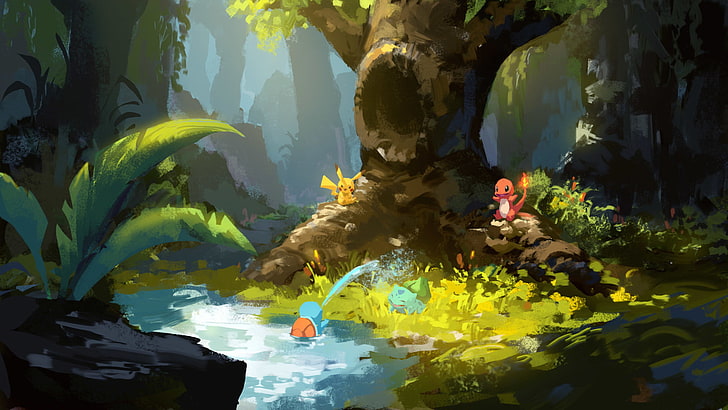
From Pocket Monsters to Worldwide Sensation: The Incredible Journey of Pokémon
In the late 1990s, a unique phenomenon emerged that would captivate countless individuals across multiple generations. This unparalleled sensation was Pokémon—a franchise that started as a simple idea and quickly blossomed into a global cultural powerhouse. In this blog post, we'll explore Pokémon's captivating history and trace the remarkable journey that transformed it into one of the most recognizable brands worldwide.
The Origins of Pokémon: Where it All Started
Originally called "Pocket Monsters," Pokémon was the brainchild of Satoshi Tajiri, the Japanese creator and founder of the game studio, Game Freak. Tajiri's childhood fascination with collecting insects and exploring natural environments inspired a game that replicated the excitement of adventure and discovery.
Concept and Vision: Tajiri envisioned players capturing, training, and trading fantastical creatures on their handheld gaming devices. He was particularly fascinated by the Game Boy's innovative "link cable," which allowed two devices to communicate, enabling players to trade and interact with one another.
Ken Sugimori's Iconic Designs: Illustrator and artist Ken Sugimori provided the visual creativity behind Pokémon, designing the original 151 Pokémon with signature art styles filled with personality and distinctiveness, capturing imaginations instantly.
Pokémon Hits the Scene: Launching a Cultural Phenomenon
Pokémon's epic journey truly took off with the Japanese release of Pokémon Red and Pokémon Green in 1996. These foundational video games positioned players as Pokémon Trainers, capturing and battling creatures to become the ultimate Pokémon Champion—a formula that quickly became addictive worldwide.
Pokémon Trading Card Game (TCG): Shortly after the games' popularity skyrocketed, the Pokémon Trading Card Game emerged, introducing an entirely new dimension to Pokémon fandom. Collectors and players could now physically own, trade, and battle Pokémon cards, expanding the experience beyond screens and into the real world.
The Pokémon Anime Series: In 1997, the Pokémon animated show first aired in Japan, following the adventures of Ash Ketchum, his beloved partner Pikachu, and their encounters with Team Rocket. The anime became an instant hit, cementing Pokémon's global appeal and driving a wave of international popularity.
Pokémon Goes Global: Expanding Worldwide
The franchise quickly broke international boundaries, making Pokémon recognizable practically everywhere. Several important factors contributed significantly to Pokémon's rapid global expansion, including:
Endless Merchandise Opportunities: Pokémon's distinctive characters and designs became an ideal branding and merchandising asset. Stores worldwide stocked shelves with branded toys, apparel, school supplies, bedroom accessories, clothing lines, and more, making Pokémon ubiquitous in children's (and adults') lives.
International Video Game Releases: Pokémon Red and Blue reached global markets in 1998, rapidly capturing North American and European imaginations. The widespread praise and popularity propelled Pokémon's reputation and made it an indispensable piece of gaming history.
Social Connections and Interactivity: Pokémon encouraged socialization like no other franchise before. The ability to trade Pokémon through the Game Boy link cable fostered community, friendships, and memorable interactive experiences among fans, solidifying emotional bonds with the brand.
Cultural Legacy and Influence: Beyond gaming, Pokémon influenced numerous societal aspects—language, fashion trends, playground games, television, and pop culture references—showcasing its remarkable cultural longevity and widespread influence.
Conclusion: Pokémon's Enduring Legacy and Continued Journey
Pokémon's astonishing history highlights the impact of innovation, strategic creative decisions, and community building to create a lasting global phenomenon. From Satoshi Tajiri's original childhood curiosity to a brand that spans generations, Pokémon exemplifies the universal appeal of exploration, friendship, and shared experiences.
The franchise continues to thrive through its constantly evolving lineup of games, collectibles, anime seasons, movies, mobile apps like Pokémon GO, and much more. Pokémon has undeniably transformed itself from an inventive idea into a timeless cultural icon. Most importantly, Pokémon continues to inspire an adventurous spirit, encouraging millions of people to explore new worlds, build friendships, and always embrace their sense of wonder.
Ultimately, Pokémon offers more than just entertainment—it serves as a powerful reminder that our passion for adventure, discovery, and connection is universal and timeless, continuing to inspire lifelong fans across generations.
